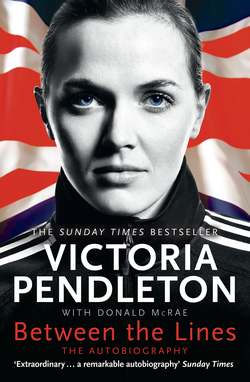Читать книгу Between the Lines: My Autobiography - Victoria Pendleton - Страница 9
Оглавление
Fred Magné was, again, disappointed in me when I flew home early in the summer of 2004. He felt I had made a mistake that would haunt me for years. Fred did not understand the extent of my distress; and he was convinced that training in Aigle remained the only possible route for me.
Eighteen months, however, marked the end for me. I had to break the cycle. Sometimes I felt it so literally I could have taken a hammer to my bike and smashed it to pieces. I sometimes wanted to quit cycling and start a new and happier life. Escaping the isolation and depression of my last months at the academy became essential.
Steve Peters had urged me to not to make any impulsive decisions about my long-term future. He reminded me how hard I had worked to secure my selection for the Athens Olympics that summer. Rather than walking away from cycling forever, I should pause, draw breath and give myself a chance to think more clearly. The prospect of achieving such serenity would be enhanced if I was back with people I liked and respected. It was time to return to my team.
Fred had little faith in the coaching system in Manchester. But world champion riders like Chris Hoy and Bradley Wiggins were improving constantly. I wanted to emulate them and so, for a few days before we left for a pre-Olympic training camp, I took a room in a rented flat with Chris. The routine was very different to Aigle. Rather than being on my own at night in a small box, feeling lost and alone, I kicked back in the living room with Chris Hoy. We watched television and ate lots of cereal in a surreal combination that would not have earned the approval of Fred Magné. But I liked the way that Chris, who always seemed to be hungry, would regularly jump up during a night of slobbing out in front of the telly to grab another bowl.
‘More cereal, Vic?’ Chris would ask.
‘Yeah, go on,’ I’d say with a laugh. ‘Why not?’
After eighteen regimented months of eating the same sort of food, at the exact same hour, day after day, week after week, it felt deliciously decadent to have another bowl of cereal at 10 o’clock at night.
It did not fit the brief of the UCI training academy; but if it was good enough for Chris Hoy, it was great for me. In training, with his imposing will, no-one worked harder than Chris. I knew he was on course to win his first Olympic gold medal in Athens. I was just going to try my best – a statement I would have found impossible to say a month earlier.
My fragility was obvious amid the stress of an Olympic Games. Everything felt sharp and clinical in the Olympic village in Athens. There were white walls everywhere, and small rooms. It resembled an institution. Surrounded by thousands of athletes, most of whom were edgy and jittery, I felt vulnerable and insignificant. Minor issues caused yet more anxiety. I worried about finding my way around the vast labyrinth of the village; and fretted about catching the right bus to the velodrome. The boys in the team would arrange to meet up for a meal and I would feel excluded and like a little girl on her first day of school – uncertain where I might sit in the dining hall.
It helped that I knew Emma Davies, the pursuit rider, and I hung out with her as often as I could. But, still, there were many days in Athens when I’d wander into the food hall on my own and have a little inner crisis about where, and with whom, I would sit. My first Olympic Games was a fraught experience. Considering the dark place I had occupied just a few months earlier, it could hardly have been different. But I was still shocked by how consuming the Olympics were in comparison to the World Championships.
I had been selected for two events: the 500m time trial and the individual sprint. On the Friday afternoon of 20 August 2004, in an Olympic velodrome as searingly hot as it was intensely pressured, I climbed on my bike just after 3.30. I had spent all my time in Aigle preparing for the sprint and so the time trial would merely be a prelude. Unlike in the sprint, where I had two successive fourth-place finishes in the Worlds, I was not really expected to compete for a medal in the time trial.
The beeps started. I held the bars tighter and took a deep breath. I put my head down and, my mind turning blank, I rose up out of my saddle. And, then, I began to race. I pedalled and pumped my legs as I hurtled around the track. The colours and sounds flattened into one long blur of painful movement.
I flashed across the line in 34.626. I had taken the lead in a new British record; and I began to breathe again as I circled the track more slowly.
My first ride as an Olympic cyclist was over, and applause rolled down the steep banks of seating. Only six riders were left. If four of them were slower than me I would win an Olympic medal. But, even amid the hot glow of competition, I was realistic. The quickest time trialists in the world were about to race.
